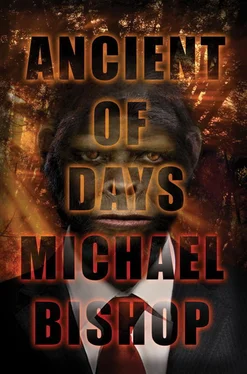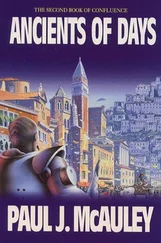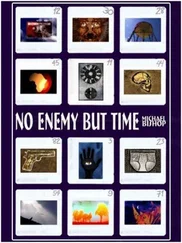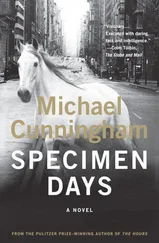It had begun to rain, lightly. An ocean of upside-down combers rumbled above the treetops. Traffic was nonexistent, and the three of us trudged uphill on the margin of the street. The plummeting runoff had not yet acquired volume or momentum, our shoes remained dry, and the cooling thunderstorm seemed an ally rather than an enemy.
“Dristle,” I said. “That’s what Livia George calls a rain like this.”
“Very good,” Adam replied.
Bilker halted at the top of the hill. An elm-lined row of clapboard houses curved downhill to our left. In the dark, we could see Atlanta’s skyline, traffic lights reflecting on wet pavement between Abraxas and the city. The old school building loomed in the rain like an insane asylum from a florid gothic novel. Its studio annex perched on the downslope of the ill-kept property as if it might soon slide away, like a stilt-supported house on the California coast. Brooding. Medieval. (Horace Walpole, Mary Shelley, and Edgar Allan Poe would have loved the place.)
“No security?” Bilker said. “At a gallery?”
“The third-floor galleries are between shows,” Adam said. “So the studio wing is tightly locked.”
“Locked-schmocked. Folks will pick locks. This place needs round-the-clock security. Needs some lights on it, too.”
“Needs its grass mowed,” I said.
“No money for a guard,” Adam said. “No money for lights.”
I remembered that on my first trip to Abraxas, David Blau had griped about the current administration’s miserly treatment of the arts. Of course, Blau and his staff members could, and did, initiate money-raising projects of their own, but funding a security force had always taken a back seat to strong financial support for major new shows and deserving artists. For the two weeks of the Kander-Montaraz-Haitian exhibit, Blau had in fact hired a full-time security guard, but no one served that function tonight because there was nothing noteworthy to protect.
Adam said we must enter from the back. We crossed an asphalt drive that dead-ended forty or fifty feet farther on, and crept into the shadow of the print shop next to the school. We advanced single-file through soggy leaves and grass, hung a left at the end of the print shop, and wound up staring into the rear half of the facility’s car park. Trees closed off the back of the lot. Power-company spools and strange varieties of metallic trash showed in the gaps among the trees as mysterious lumps and silhouettes. Tonight, unlike in February, the trees’ branches were weighted with summer foliage, and the mist dripping through the leaves made the asphalt echo as if it were a basement drying room with dozens of frilly black-green dresses on its lines. We entered the shelter of a covered rampway leading directly to the main building’s rear entrance. From this ramp, we saw the whole parking lot and, straight across from us, the studio wing enclosing the lot on that side. Near the building’s door sat the only vehicle in the lot, a red GM pickup with its tailgate lowered. Whoever had parked it had placed an extension ladder in its loadbed so that the ladder cleared the rampway’s corrugated roof and leaned against the wall about twenty feet above the covered door.
“He’s here,” I said. “The bastard’s actually here.”
Adam shushed me. He told Bilker and me to stay under cover while he tried to determine exactly how Craig had entered Abraxas. Adam would go because he was less likely to be seen than Bilker or I. So, bending his back almost parallel to the asphalt, he did a graceful Groucho Marx slither that carried him to a crouching position behind the GM. He tilted his head to gaze up into the rain at the ladder and the wall. Then he Groucho Marx’d his way back to us and said that Craig had apparently climbed to the full extension of the ladder and then thrown a rope with a grappling hook into the barnlike window on the building’s third floor. This window belonged to a vacant supply room across an interior corridor from the curator’s office. The grappling hook was still caught on the sill, the rope from it dangling down a foot or two below the top of the ladder. Craig probably did not intend to use it again, though, because he could far more easily come down the stairs and let himself out the back than risk the slippery rope and the slippery ladder by which he had gained entry.
“We ought to call the house,” I said. “Tell Niedrach.”
“No. Up there, Mister Paul, I am going now.” Adam took a key from his trouser pocket and gave it to Bilker. “Go inside and guard the stairs so that, by them, the villain does not make successful his getaway.”
“What am I supposed to do?”
“Following me up is okay and probably silenter than taking stairs. Or wait down here. I am happier, though, should you come.”
“Why?”
“Morale support: To subdue young Puddicombe may take two of us—someone to bludger him, someone to rescue Tiny Paul.”
“Then you’d better let me do it,” Bilker said.
“I fear you’re too heavy,” Adam said. “Paul is much lighter.” He looked me over a tad grimly. “By comparison.”
I was scared. Neither Adam nor I had a firearm. Bilker would have the Ruger, of course, but he would be standing in the downstairs corridor waiting for Craig to come to him. Craig might not choose to do so. He’d have a weapon or two of his own, and if Adam and I bumbled into him in the galleries, he would not hesitate to cut us down. More important, if he had rappeled up the wall after climbing the first third of the way on his extension ladder, could we expect him to have T. P.? Our chances of retrieving the child alive dwindled by the moment. I think even Adam knew that.
To Bilker’s and my surprise, the habiline shed his clothes. He pulled off his shoes, shimmied out of his trousers, and ducked free of his shirt. “I am silenter this way, and better camouflaged… like a commando.” He looked at me. “You too?”
“Oh, no.”
“The shoes, then. The shoes and socks. To make you have a grip both firm and silent on the ladder rungs.”
Bilker grinned, enjoying my discomfiture. I removed my shoes and socks. Adam nodded the bodyguard toward the door, and Bilker used the key to open it. He gave us a thumbs-up sign and disappeared into the concrete maw of the building. Adam and I ran to the truck’s loadbed, eased into it, and squatted in the rain looking at the great hinged door high in the rear wall. Next to this door, or shutter, were three tall windows of a more conventional design; they lacked glass, and someone had fitted them with opaque sheets of polyethylene, which, now tattered, made faint popping noises. My fear deepened. I was developing, while still on the ground (or near it), a bad case of acrophobia. A surreal kind of dizziness gripped me. Adam attributed to me more courage and athletic ability than I had. By this route, I could fall to my death trying to enter Abraxas.
“Adam—”
“I will go first. No need to brace ladder. Side of truck suffices.” Naked, the mist matting his body hair, he swung to the pickup’s side to mount the ladder. Bouncing on its rungs and pulling at its uprights, he tested its reliability. “Is okay,” he announced, and he climbed it like a monkey shinnying lickety-split up a tree. At the top, Adam grabbed the rope hanging from the sill and threw himself clear of the ladder. Expecting him to come crashing down on the rampway’s corrugated roof, I flinched. Adam’s feet hit the vertical face of the wall, though, and he walked himself up the rope to the hinged window shutter. Here, he turned and squatted on the sill, a gargoyle on a somewhat shoddy cathedral. The gargoyle beckoned to me.
I willed myself to move. My bare feet tingled on the ladder’s cold aluminum rungs. I climbed with my eyes on Adam. If I looked down, I’d panic. The habiline drew nearer as I rose, but still seemed far, far away. At the top of the ladder, I had no idea what to do. I could not grab the hanging rope without letting go of the ladder’s uprights. Trapped between heaven and hell, I laid my face against the unyielding bricks of the building. Dear God. Dear God.
Читать дальше












